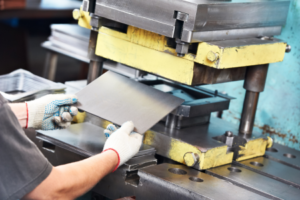Now that you have a basic understanding of the different sheet metal materials available, let’s explore the factors to consider when selecting the right one for your project:
Application

The first and most critical factor is the intended application of the sheet metal. Consider the environment it will be exposed to, whether it will be indoors or outdoors, and the specific demands of your project. For example, outdoor applications may require corrosion-resistant materials like stainless steel or galvanized steel, while indoor decorative projects might benefit from the aesthetic qualities of brass or copper.
Strength and Durability
Evaluate the strength and durability requirements of your project. Some materials, like steel and titanium, offer exceptional strength and toughness, making them suitable for structural components. Others, like aluminum and copper, may be more suitable for lightweight or decorative purposes.
Corrosion Resistance
If your project will be exposed to moisture or corrosive substances, choosing a material with good corrosion resistance is essential. Stainless steel, aluminum, and certain alloys like Inconel excel in such conditions.
Conductivity
For electrical or thermal conductivity applications, consider materials like copper or aluminum. Copper is an excellent conductor of electricity, while aluminum is often used for its heat-dissipating properties.
Aesthetics
If appearance matters for your project, select a material that complements your design. Brass and copper, with their attractive finishes, are popular choices for decorative elements.
Cost
Budget constraints are a crucial consideration. Some materials, like titanium, can be significantly more expensive than others. Balance your project’s requirements with its budget to make an informed decision.
Fabrication and Machinability
Think about how easy it is to work with the chosen material. Some materials may require specialized equipment or techniques for cutting, bending, or welding. Make sure your fabrication capabilities align with the material’s demands.
Weight
Weight is a crucial factor in industries like automotive and aerospace. Aluminum’s low density makes it an excellent choice when weight reduction is essential.
Recyclability
If sustainability is a concern, consider the recyclability of the material. Steel and aluminum, for example, are highly recyclable, making them environmentally friendly choices.
Regulatory and Compliance Requirements
Depending on your industry or location, there may be regulatory requirements or standards that dictate the type of material you can use. Ensure your choice complies with any relevant regulations.
Maintenance
Consider the long-term maintenance requirements of your project. Some materials may require more care and maintenance to retain their appearance and functionality.
Conclusion
Selecting the right type of sheet metal for your project is a critical decision that can significantly impact its success. By considering factors such as application, strength, corrosion resistance, aesthetics, cost, and more, you can make an informed choice that meets your project’s needs. Remember that no single material is ideal for every situation, so carefully evaluate your project’s requirements and consult with experts if necessary. With the right sheet metal material, your project can achieve the desired functionality, longevity, and aesthetic appeal.
